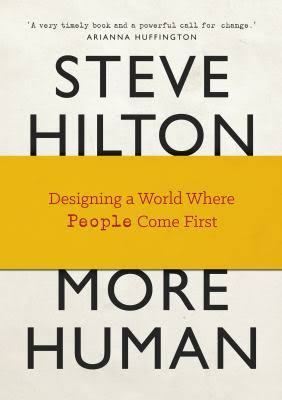by Rod Collins, Director of Innovation at Optimity Advisors
There is a rapidly emerging phenomenon that, while hidden in plain sight, is about to dramatically transform the longstanding fundamentals of business. While this nonpareil is often touted as a defining attribute of most business organizations, the simple reality is that, for too many business leaders, their aspirations are nothing more than lip service. That's because their core organizational structures are not designed to support the cultivation of this increasingly vital phenomenon: a fully human work culture.
Despite all the corporate rhetoric about people being a company's "most important assets," conventional practice usually favors making money over building culture when the two come in conflict. However, management innovations by a new breed of business leaders are challenging the business wisdom of conventional practice. Steve Hilton, visiting professor at Stanford University and former adviser to the U.K. Prime Minister David Cameron, sounds a clarion call for change in his recent book, More Human: Designing a World Where People Come First. Hilton argues that the working models of government and business don't work and are unsustainable in a hyper-connected world because their underlying systems and structures have a basic design flaw: the prioritization of numbers over people. That's a problem, according to Hilton, because real businesses are "about people, about bringing people together in a structured way to benefit each other and society."
The Dumbest Idea in the World
Since the genesis of Scientific Management at the end of the nineteenth century, the context of business has been about delivering the numbers. It's been about market share, profit margins, return on investment, and earnings per share. Business has been so defined by numbers that the creation of shareholder wealth--making money--has become the commonly accepted purpose of a business. However, this conventional wisdom has come under recent fire from both traditional and new breed business leaders.
Hilton cites a March 2009 Financial Times interview where Jack Welch, the celebrated former CEO of General Electric, referred to maximizing shareholder value as "the dumbest idea in the world." This may explain why the innovative leaders of today's vanguard companies, such as Zappos, Apple, and LEGO, are redefining the purpose of a business as the creation of customer value. It may also explain why the most important number at these innovative firms is not about money, it's about people: the Net Promoter score, which measures the intensity of customer delight with a company's products or services.
The True Purpose of a Business
This is not to imply that the leaders of these vanguard companies believe that making money is not important. Quite the contrary, these leaders fully understand that positive cash flow is the lifeblood of business continuity. But they also understand that, without customers, there is no cash flow and that making money is not the purpose, but rather the reward companies receive when they fulfill the true purpose of a business by delighting their customers. In other words, the vanguard leaders believe that businesses, at their core, are human rather than financial enterprises. Like Hilton, they believe that real businesses are about people. And if work is really about people, then building highly effective human cultures--both work and customer cultures--needs to be the organizing principle for an organization's systems and structures.
Unfortunately, in most traditional organizations, building fully human work cultures is not a serious priority. Hilton observes, in the typical bureaucratic organization, "people are often made to behave in inhuman ways by the systems and structures around them." Hilton believes that people are not instinctively inhuman, but are forced by the bureaucratic norms of traditional structures to behave in ways that they would not naturally choose. As a consequence, workers are often viewed as costs and customers as sources of revenues. When we treat people as numbers, we all lose a little bit of our humanity.
A Post-Bureaucratic Age
Hilton argues that people are happiest when they can relate to each other in a human way and that people work best when things are organized on a human scale. However, organizing on a human scale means coordinating the voluntary contributions of large numbers of people, and until recently, that has been nearly impossible. While bureaucracy is a workable solution for coordinating large work groups, the downside of this human architecture is that the distribution of work is based on assigned tasks rather than voluntary contributions, which may explain why, in the most recent Gallup study, only three out of every ten employees feels engaged in their jobs. Nevertheless, people have chosen to accept the inhumanity of bureaucratic structures because there didn't seem to be a better alternative.
However, thanks to the digital revolution, bureaucracy no longer has a monopoly as a workable design for large work groups. In the quest to build more human organizations, an unusual suspect--technology--is coming to the rescue. While technology is often viewed as dehumanizing, Hilton observes that the digital revolution is giving us the tools to be more human by transforming the world into a hyper-connected network where the distribution of work based on self-organized voluntary contributions is not only possible, but also practical and efficient. Hilton's observation is supported by the sudden emergence of a new management paradigm based on the notion that the most effective way to organize the work of large numbers is to build peer-to-peer networks rather than top-down hierarchies. This new paradigm is the energy behind Wikipedia, Craigslist, eBay, Airbnb, Uber, and Linux, all of which were inconceivable a mere two decades ago. This new paradigm is a clear indicator that we are moving into what Hilton calls a "post-bureaucratic age."
The Importance of the Human Experience
The structural transformation from hierarchies to networks across all social institutions will dramatically alter the way our basic systems work. We see evidence of this in the rapid shift from traditional to Agile methodologies in the development of software systems. Rather than designing grand plans around the dictated preferences of managers and engineers who are far removed from the people affected by their decisions, Agile software developers puts the user at the center of the work and leverage self-managed teams working in short iterative phases, called "sprints," to continually align what they build with what the customer needs. The driving force behind this rapid shift in the software world is that Agile is smarter, faster, and cheaper for the simple reason that iterative sprints keep companies better connected to the human experience of their users in a new business world where success is more a factor of the quality of the human experience than the efficiency of the financial transaction.
In a hyper-connected world, businesses cannot afford to ignore the importance of the human experience. A flight attendant unreasonably mistreating a passenger or a customer service representative going out of her way to resolve a customer issue can go viral on social media in a matter of minutes and either nullify or magnify the value of the budget spent on building a company's brand.
Small Things Can Make a Big Difference
Hilton points out that one of the ways to build a fully human culture is to trust workers to make local decisions. He suggests that if the doctors and nurses in the UK's National Health Service were given more autonomy to make decisions around all aspects of care in hospital facilities, they would be able to act on the small things that make a big difference in the experience of their patients.
An organization that agrees with Hilton on letting workers make local decisions is Zappos, which found out how small things can make a big difference the day the story of one of their customers went viral. Zaz Lamarr's mother had been stricken with cancer, and Zaz thought a pair of shoes might brighten her mom's spirits. However, given the weight loss that can happen with cancer patients, Zaz wasn't sure what size would fit her mother. So, she placed an order with Zappos for several pairs of shoes in a variety of sizes hoping at least one of them would work. Fortunately, two of the pairs fit and Zaz made arrangements to return the remaining shoes. However, before Zaz could get to the UPS store, her mother took a sudden turn for the worse and passed away. When the Zappos customer service representative (CSR) contacted Zaz and found out why she didn't have time to return the shoes, rather than insisting that Zaz had to make time to go to the UPS store, the people at Zappos sent UPS to Zaz, and then the next day sent Zaz a beautiful bouquet of flowers to let her know they were thinking of her in her time of need.
The touching humanity of sending flowers rather than insisting on policy compliance--a decision that Zappos' CSR's can make--is a reflection of the fully human culture for which Zappos is well known. In a hyper-connected world reshaped by the digital revolution, Hilton is right. Real business is about people.
Rod Collins (@collinsrod) is the Director of Innovation at Optimity Advisors and the author of Wiki Management: A Revolutionary New Model for a Rapidly Changing and Collaborative World (AMACOM Books). He writes for this column on the first Thursday of each month.

